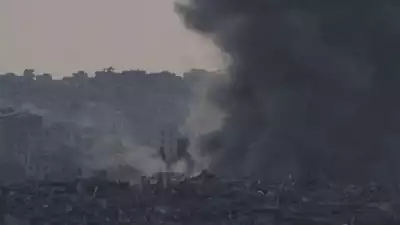Talks over a truce in Gaza conclude without a resolution as the end of Ramadan approaches
CAIRO/RAFAH: There are just a few days left to put an end to hostilities in time for Ramadan, so ceasefire negotiations between Hamas and mediators in Cairo on Tuesday ended without any progress.

After two days of discussions, the militant organization submitted its proposal for a ceasefire deal to the mediators, according to senior Hamas official Bassem Naim, who spoke to Reuters. The militant group was now awaiting a response from the Israelis, who did not participate in this round of negotiations.
Pressuring Prime Minister Benjamin Netanyahu to make a deal is now up to the Americans, according to Naim, who said that “he doesn’t want to reach an agreement.”
Israel has opted not to openly comment on the Cairo negotiations.
Israel was keeping away, a source previously told Reuters, since Hamas has refused to provide a list of all the captives who are still alive. Since captives were being held by several parties and were dispersed around the conflict zone, Naim said that a truce was a prerequisite for this.
In anticipation of Ramadan, which is scheduled to begin at the beginning of next week, the Cairo negotiations were portrayed as the last obstacle to the war’s first lengthy ceasefire, a 40-day truce during which scores of prisoners would be released and supplies would be poured into Gaza to prevent a man-made famine.
On Monday, Egyptian security sources said that they remained in contact with the Israelis to allow the discussions to go on without an Israeli team.
Washington, the closest friend of Israel and a supporter of the ceasefire negotiations has said that an agreement that has been authorized by Israel is already on the table and that Hamas must decide whether to accept it. In an effort to shift responsibility from Israel in the event that the negotiations end in failure to reach a settlement, Hamas contests this account.
The United States has also urged Israel to take more action to lessen the humanitarian crisis in Gaza, where Israel’s assault—which came following 1,200 fatal Hamas assaults in October—has claimed over 30,000 lives.
A Hunger Strike Gaza
As humanitarian supplies, which have already been drastically reduced since the beginning of the conflict, have decreased to almost nothing over the last month, famine is now engulfing the beleaguered Gaza Strip. Large portions of the region are totally cut off from food sources. A growing number of youngsters are starving to death in Gaza’s few operating hospitals, which are already overflowing with injured patients.
At the Al-Awda clinic in Rafah, Ahmed Cannan, a child with sunken eyes and a gaunt face, lay on a bed covered with a yellow cardigan. Since the battle began, he has dropped to half his original weight, weighing just 6 kg (13 pounds).
“Every day, things get worse for him. God save us from the impending danger,” Israa Kalakh, his aunt, told Reuters.
Such malnourished youngsters were suddenly arriving at the clinic in previously unheard-of numbers, according to nurse Diaa Al-Shaer. “We will face a large number of patients who suffer from this, which is malnutrition,” she said.
The north of Gaza, where TV crews and relief organizations cannot get, is where things are the worst. According to Gaza’s health officials, a hospital has seen 15 youngsters pass away from starvation or dehydration.
Israel claims that it is prepared to let more assistance into Gaza via the two crossings that it has authorized to open, and it holds the UN and other relief organizations accountable for their inability to disperse it more extensively.
The humanitarian organizations claim that due to the collapse of law and order, food delivery is now impossible and that Israel, whose forces have overrun Gaza’s communities and are patrolling them, is responsible for ensuring access and security.
According to Adele Khodr, regional director of UNICEF for the Middle East and North Africa, “the sense of helplessness and despair among parents and doctors in realizing that lifesaving aid, just a few kilometers away, is being kept out of reach must be unbearable.”







